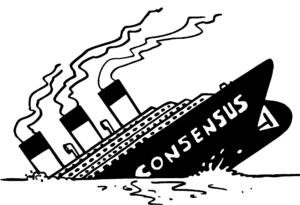
The senior manager of a large organization called me seeking help.
“We are stiff and bureaucratic,” he said, “but we want to be more open. We are formal until it hurts but we’d like more innovation. Can you help us, Mr. Kaufman? Can you share a new perspective and bring some fresh ideas?”
I accepted the assignment and found that what he said was true: they had an old culture of top-down control, suffocating authority, miles of red tape and rigid ways of working. They clearly needed to consider an organizational culture change.
With enthusiasm, I prepared a speech that opened many eyes about organizational culture change. Laughter rolled through the audience, self-reflection mixed with humor. I saw skepticism and resignation, but also interest, possibility and a desire for new action and organizational culture change.
The next day my telephone rang. Someone in the audience felt I had gone too far, was too provocative, had challenged too many sacrosanct assumptions.
I was concerned, of course, but also began to wonder. Had I stayed within the safety zone of caution and consensus, would my remarks have hit the spot at all; would my speech have made a difference? Without breaking the bounds of consensus would they have any chance of successfully enjoying organizational culture change?
My friend Chauncey Bell opened my eyes on this topic with a point of view I found completely unexpected. He said, “There are two times when consensus is required. First, when there is fundamental distrust in the group. Second, when you want to guarantee a lack of innovation.”
That statement caught my attention! I can understand why consensus works when distrust prevails within a group. After all, if everyone agrees on everything, then anyone will notice anything out of kilter.
It was the second half of Chauncey’s claim that made me think much harder. If we cherish consensus and complete agreement, where is the space for “out of the box” new thinking and “off the wall” ideas?
It is risky to try something new, change from one day to the next, do something now you have never done before. But the world is changing day by day and innovation is all around us.
The most risky approach to your group’s success may be trying to achieve consensus! It can hamper organizational culture change efforts that just might improve a company.
Key Learning Point For Organizational Culture Change
To say you seek innovation – but also want consensus – can be a recipe for frustration and confusion. Organization culture change cannot happen without shaking things up a bit.
“Don’t rock the boat” used to be the safest path to find the future and climb the company ladder. Today, a boat that won’t rock is very likely sinking along with any effort at instituting organizational culture change!
Action Steps For Organizational Culture Change
How open are you and your organization to completely new ideas? How welcoming are you to diversity, controversy and well-intended provocation? Any chance of organizational culture change depends on openness.
If there are questions you cannot raise, issues you dare not discuss or items banned from your agenda, make the space and time to relook and reconsider. Organizational culture change might be in order to foster creativity and new ideas.
Assess your culture now. Identify your current strengths and where you must improve. Create alignment with your team. Download “Do you have an Uplifting Service Culture? assessment questionnaire now.
—————————————————————————————————————————–
You may use this article in your free newsletter, website or publication providing you include this complete statement (below) with active links to the websites:
Copyright, Ron Kaufman. Used with permission. Ron Kaufman is the world’s leading educator and motivator for upgrading customer service and uplifting service culture. He is author of the bestselling “Uplifting Service” book and founder of Uplifting Service. To enjoy more customer service training and service culture articles, visit www.RonKaufman.com.
For commercial use of this article in a paid newsletter, publication, or training program, please contact us.



